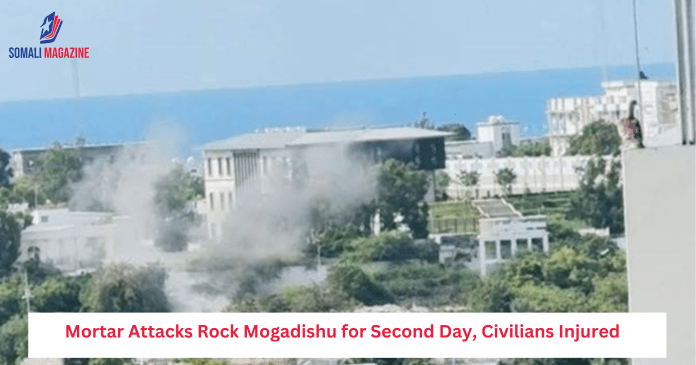Facebook Twitter (X) Instagram Somali Magazine - People's Magazine
Suspected Al-Shabaab militants target airport and UN compound as shells hit residential neighborhoods, injuring women and children.
The Somali capital, Mogadishu, came under attack for the second day in a row on Sunday morning as suspected Al-Shabaab militants launched a series of mortar shells towards high-profile targets. According to local sources, six mortar rounds were fired, aiming at Aden Adde International Airport and the nearby Halane compound—both heavily guarded zones known for housing foreign embassies, African Union forces, and United Nations offices.
Two of the mortar shells missed their intended targets and fell into the Kaawa Godey neighborhood, a residential area not far from the airport. As a result, several civilians were injured. A local resident, speaking to Somali media, said that a woman and a young boy were hurt when one of the shells exploded in the area.
“One of the mortar shells fell in the Kaawa Godey neighborhood this morning, injuring a woman from among the residents. I was also told that another boy was injured,” said the resident.
Emergency services quickly responded, and the wounded were rushed to a local hospital for treatment. Their conditions are not yet known.
So far, Somali federal security agencies have not released an official statement about the attack or any countermeasures taken. The lack of information has left many Mogadishu residents worried, especially as this attack closely follows a similar incident the day before.
On Saturday, mortar shells landed in the Warta Nabada and Boondheere districts, injuring at least six civilians. One of the injured was identified as Gurey, a staff member at the National Theater of Somalia. The Saturday attack also caused damage to residential buildings and disrupted life in neighborhoods known for their dense populations and busy streets.
While no group has claimed responsibility for either of the weekend attacks, Al-Shabaab—a militant group linked to al-Qaeda—has a long history of using mortar fire as part of its violent campaign against the Somali government and international forces. The group has previously carried out similar attacks on strategic sites including the Mogadishu airport, the Halane base, and even Villa Somalia, the presidential palace.
Al-Shabaab has been waging a brutal insurgency in Somalia for over a decade. Despite efforts by the Somali military, backed by African Union forces and international partners, the group continues to pose a major threat. It frequently uses improvised explosive devices (IEDs), suicide bombers, and mortar attacks to destabilize the country, particularly targeting areas with government buildings or international presence.
The twin mortar attacks have heightened concerns among residents, who fear a potential increase in violence as the group looks to assert its presence amid ongoing military operations against them in other regions of the country. Many families living near the airport and international compounds are now calling for increased protection and better communication from the government.
“I feel like we’re always in danger, even in our homes,” said a mother of three who lives near Kaawa Godey. “The government needs to do more to protect civilians. These attacks keep happening, and we are the ones paying the price.”
As Somalia continues to battle extremist violence, the latest incidents underscore the challenges in securing even the most fortified areas. It remains unclear whether any arrests have been made or if additional attacks are expected in the coming days.
The Somali people, particularly those in Mogadishu, remain resilient in the face of such terror. However, many are urging the government and its international allies to boost security efforts and prevent more innocent lives from being caught in the conflict.

